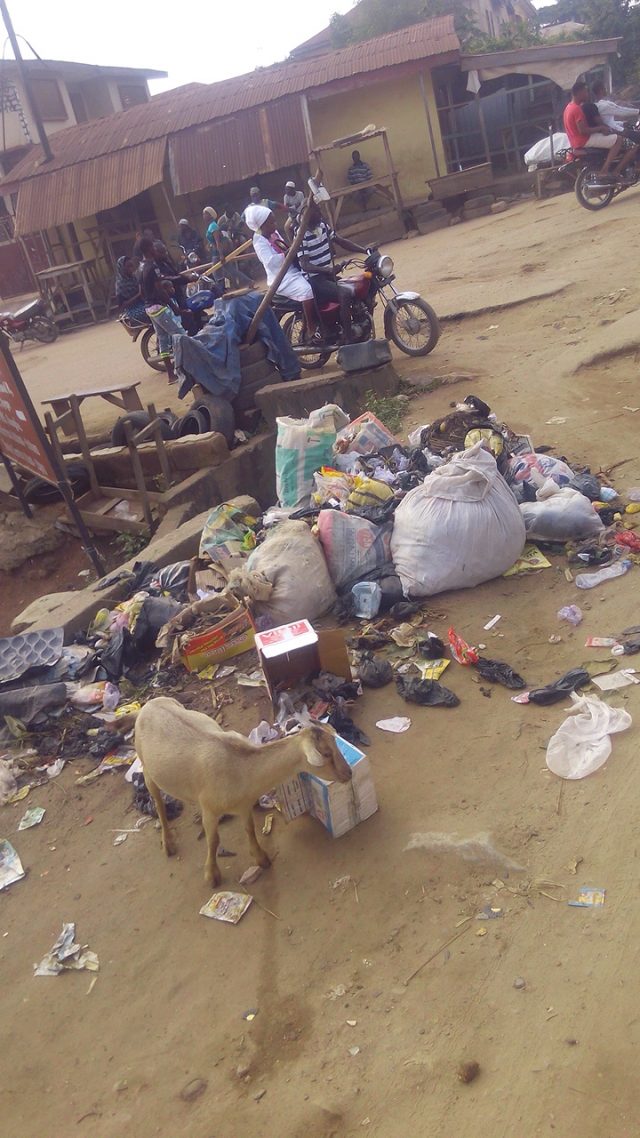Dappa Maharajah.
RAINY season in the mangrove swamps, rainforest and mountainous-derived savannah of Ondo State is often times accompanied with fears across the 18 council areas of the state, especially in the south senatorial district, among the four coastal council areas, where there is acute lack of systemic means of waste management and disposal for the inhabitants.
In the two other senatorial districts: north and central, the situation is far better, especially in Akure, the capital and metropolitan city of the state, though there are still perceivable inadequacies and poor coverage in the operation of Ondo State Waste Management Agency (OSWMA).
Aside health dangers of nylon bags, cellophanes, plastic bottles and others, they also constitute ecological hazards because they are classified as non biodegradables, littered around the streets and building up to block drainages, where there are few infrastructure.
Mr Aralu Emmanuel, a youth leader in Ayetoro community, an island in Ilaje council area, which more than 3 kilometres of its land mass has been submerged, raised an alarm over the dangers of the ecological disaster that are often caused by huge wastes in the sea.
Aralu noted that there is always a tidal rise during the rainy season due to more waste dumps from the rivulets and drainages into the seaways, resulting into recurrent sea surges that are threatening the existence of the people living in the riverine areas of the state.
“The negative impacts are far reaching because of the dangers that live with us here on our few land, marine environments and ecosystem. We are mainly fishers here, it is drastically affecting our economy and making our people poorer by the day,” he said.
The National Coordinator of Ondo State Women Must Count, Mrs Olamide Falana, lamented the recent hike in the charges levelled on the people by the agency, even when the services rendered by the OSWMA staff are inconsistent, non regular and customer-centred.
Falana, who stays in one of the middle class areas, protested that there is high level of discrimination by the agency, whose workers allowed the customers to perform half their duties, compared to the special treatment they offer customers in high profile estates.
“Most times they would wait for us to pack the wastes into their truck; and when they don’t see us at homes, they often zoom off, leaving the refuse where we left them. Yet, they would charge for the service not rendered.
“And to make the matter worse, they still go ahead to charge us the same amount with those privileged people living in GRAs and upscale areas, despite the fact that the rich people have more wastes than we do, considering their consumables,” she said.
While residents of areas like Oloko, Temidire, Orita-Obele, Alasaare and their environs lamented that OSWMA does not ply their areas due to the bad road networks, especially during the rainy season, describing them as smudgy, difficult terrains for pedestrians let alone vehicles.
They disclosed that that most houses are exposed and vulnerable to the dangers of huge dung hills littering the environment; worse enough, the constant degradation of the ozone layer and air pollution as a result of the smoke emitted from burning the refuse.
Moreover, The Guardian discovered that attempts to keep some of those plastic wastes off the streets for further usage through recycling process, also has its own adverse health implications.
The National Coordinator of We Are Making a Difference (MAD) group, Ms.Tony Joy, recently led some NGOs through an initiative tagged: “Hold it till You can Bin It,” to sensitize people on waste management.
Tony said they were tired of seeing dirt around the streets and have a vision that in 2020, Nigeria will be one of the cleanest nations in the world.
Another Akure resident, Mr. Oladeji Ebisemiju, stressed that he was aware of the underlying health implications and dangers in the recycling of plastic for human usage. He disclosed that they contain carcinogenic substances that make people prone to cancer, and estrogenic properties which impair the reproductive organs.
“These harmful substances are easily elicited from the containers when hot food items, water or the likes are put inside them, and consumed to our own detriment. More consumables and edibles are now packaged in plastic sheets or sachets, which most times have been contaminated due to previous use,” he said.
Ebisemiju, who is the state secretary of Young Democratic Party (YDP), attributed the failure of the waste management systems to the faulty type of federalism practised in the country, which he said crippled the local government system.
According to him, it is only the local government authority that can effectively manage such duty without leaving any stone unturned due to its closeness to the people and grassroot.
He urged the state government to jettison the idea of caretakers and conduct elections for substantive executive chairmen that would be responsible to all the yearnings of the people.
Nevertheless, the Ondo State governor, Mr. Oluwarotimi Akeredolu (SAN), reiterated his administration’s commitment to make the environmental better for sustainable development, stressing that there is need to protect the environment for the collective wellbeing of mankind.
The governor, who used the occasion of the last World Environment Day celebration in Akure to affirm his commitment to the crusade, decried indiscriminate waste disposal, littering and open defecation by people, adding that such practice is tantamount to inviting diseases like cholera and diarrhoea.
He recalled that the ancestors, in the stone and crude age, started as nomads who moved from one place to another in search of fruits for their survival without destroying the natural environment. He iterated that his administration would put adequate infrastructure in place and even get the state’s forest back.
According to him, “Our administration appreciates the essence of this celebration. We are determined to leave our immediate environment better that we met it. We will continue to plant trees and discourage, actively, all activities which discount the very essence of existence.
“We will ensure that we reduce the nefarious activities of those who conduct themselves in manners that depict them as enemies of this world and violators of the natural beauty given to mankind freely by God.”
Akeredolu, who described the theme of this year’s event, “Connecting people to nature,” as apt, said it was “unmistakable suggestion of the indispensable symbiotic relationship between human beings and their natural environment for quality existence.
“The choice of this theme appears deliberate; it sets out to showcase the connection between man or woman and nature. It will afford all relevant stakeholders to think deeply about this all-important subject matter and give useful contributions that will engender environmental sustainability.”
The governor said the event would serve as a basis for assessing the world’s achievements in enhancing environmental friendliness as a way of ensuring sustainable and equitable development, urging school children and non-governmental to take the message of clean environment home for effective dissemination.






